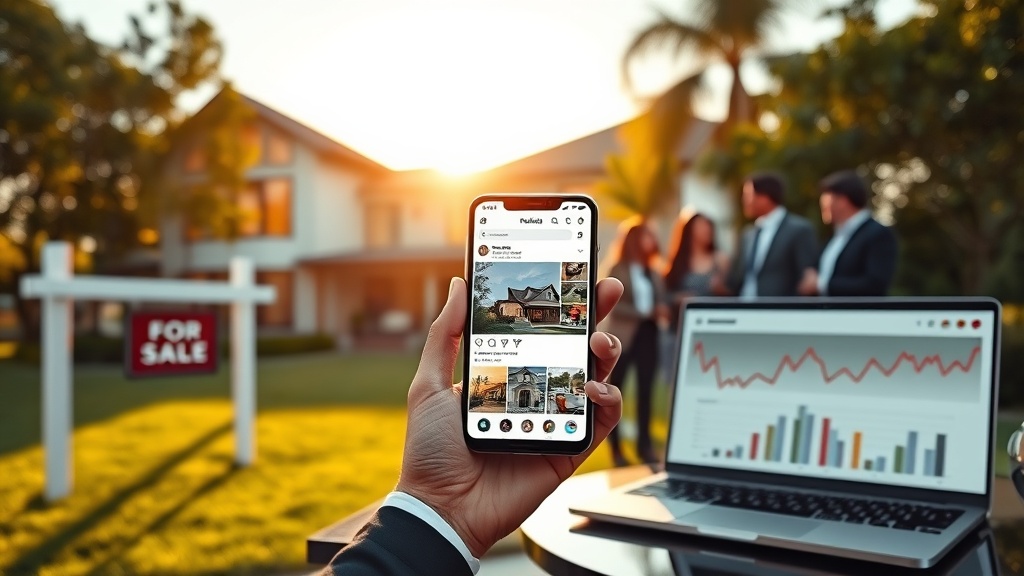Top Social Media Platforms Every Real Estate Agent Should Master

" "
In today's digital age, the realm of real estate is no longer just about open houses and cold calls. The digital transformation has made social media an indispensable tool for real estate agents. It not only helps in reaching a broader audience but also in establishing a personal brand, engaging with potential clients, and staying ahead of the competition. But with so many platforms available, which ones should a savvy real estate agent focus on? This blog post will delve into the top three social media platforms that every real estate agent should master, providing insights, historical context, and future implications. Let's dive in!
Why Social Media Matters for Real Estate Agents
Before we explore the specific platforms, it's crucial to understand why social media has become a cornerstone for real estate professionals.
Wide Reach: Social media platforms boast billions of users worldwide. This extensive reach allows agents to connect with potential buyers and sellers beyond their immediate geographical location.
Engagement: Unlike traditional marketing methods, social media encourages two-way communication. This engagement helps build trust and relationships with prospects.
Cost-Effective Marketing: Social media offers a variety of free and paid advertising options that can be tailored to fit any budget.
Brand Building: Consistent, relevant content can establish an agent as a thought leader in the real estate industry.
Data Analytics: Platforms provide insights into user behavior and preferences, allowing for more targeted marketing strategies.
1. Facebook: The Social Network Behemoth
Historical Context
Launched in 2004, Facebook has evolved from a college networking site to the largest social media platform globally. With over 2.8 billion monthly active users, Facebook's reach is unparalleled.
Current Trends
Facebook Groups: These are increasingly popular for niche markets. Real estate agents can create or join groups that focus on local markets, where they can share listings, advice, and engage with community members.
Live Video: Facebook Live allows agents to host virtual open houses or Q&A sessions, providing real-time interaction with potential buyers.
Marketplace: A growing number of users are turning to Facebook Marketplace to browse real estate listings, making it a valuable tool for agents.
Real-World Scenario
Imagine Sarah, a real estate agent in Austin, Texas. She leverages Facebook Live to host virtual tours of her listings, attracting viewers from across the country. By creating engaging content and using Facebook Ads to target her desired audience, Sarah has expanded her client base significantly.
Future Implications
With the platform's continuous innovation, Facebook is likely to incorporate more AI-driven features, making it easier for agents to target specific demographics. The integration of augmented reality (AR) could also revolutionize virtual home tours.
2. Instagram: The Visual Storyteller
Historical Context
Instagram, which launched in 2010 and was acquired by Facebook in 2012, started as a simple photo-sharing app. It has since grown into a powerful marketing tool with over 1 billion active users.
Current Trends
Stories and Reels: Short-form content is king. Stories and Reels offer quick, engaging snippets that capture attention and increase interaction.
IGTV: Longer video content on IGTV allows agents to dive deeper into topics, such as market trends or detailed home tours.
Visual Listings: Instagram's visual nature makes it perfect for showcasing stunning property photos and videos.
Real-World Scenario
Consider Alex, a real estate agent in Los Angeles. By using Instagram Reels, he creates quick, engaging videos highlighting the best features of his properties. His use of hashtags and geotags helps attract a local audience, while collaborations with home décor influencers broaden his reach.
Future Implications
Instagram's focus on e-commerce could eventually allow agents to complete transactions directly on the platform. Enhanced AR features may provide immersive experiences for potential buyers.
3. LinkedIn: The Professional Network
Historical Context
LinkedIn, launched in 2003, is the world's largest professional networking site. While not traditionally seen as a direct sales platform, its value for real estate agents lies in networking and establishing authority.
Current Trends
Thought Leadership: Publishing articles and posts on LinkedIn can position agents as industry experts.
Networking: Connecting with other professionals, such as mortgage brokers and real estate lawyers, can lead to valuable partnerships.
Recruitment: For agents looking to expand their team, LinkedIn is an excellent platform for finding qualified candidates.
Real-World Scenario
Meet Rachel, a real estate broker in New York City. She regularly publishes insightful articles about real estate trends on LinkedIn, establishing herself as an industry thought leader. Her active engagement with her network has led to partnerships and referrals that have significantly boosted her business.
Future Implications
As LinkedIn continues to grow, it may incorporate more advanced tools for business development and networking, further solidifying its role as a critical platform for real estate professionals.
Balancing Your Social Media Strategy
While mastering these platforms is essential, it's equally important for agents to tailor their strategies based on their target audience and market dynamics. Here's how to do it:
Know Your Audience: Different demographics favor different platforms. Research where your potential clients are most active.
Content Is King: Create engaging, informative, and visually appealing content that adds value to your audience.
Consistent Engagement: Regularly interact with your audience through comments, messages, and posts to build strong relationships.
Analyze and Adapt: Use platform analytics to track performance. Adapt your strategy based on what works best.
Conclusion
Social media is not a one-size-fits-all solution. Each platform offers unique features and audiences that can significantly benefit real estate agents. By mastering Facebook, Instagram, and LinkedIn, agents can expand their reach, build their brand, and ultimately drive more sales. However, the social media landscape is ever-evolving, and staying updated with the latest trends and features is crucial for long-term success. Embrace these platforms, experiment with different strategies, and watch your real estate business thrive in the digital age.











